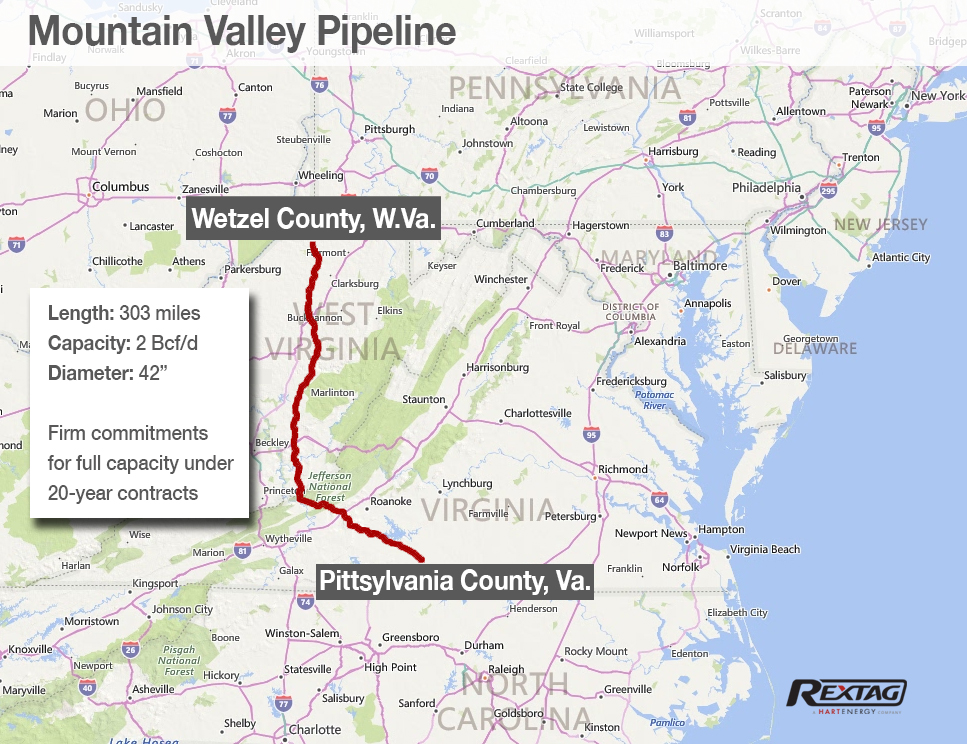Editor’s note: This article has been updated with comments from Equitrans and EQT.
In the end, it took nothing less than an extraordinary act of a Congress desperate to avert a catastrophic unraveling of the global economy to rescue the Mountain Valley Pipeline (MVP).
But rescued it is.
In the late evening of June 1, the Senate voted 63-36 to pass debt ceiling legislation that included provisions to clear the way to build MVP, as well as amend the National Environmental Policy Act (NEPA) to streamline the permitting process for infrastructure. President Joe Biden is expected to sign it into law later today before he addresses the nation from the Oval Office.
“The vote in the Senate is significant, not only because it guarantees passage of the package, which includes NEPA reforms and approval of the Mountain Valley Pipeline, but because you have had a bipartisan vote in both houses of Congress in support of the reforms and MVP,” Jack Belcher, principal at Cornerstone Government Affairs, told Hart Energy.
Passage did not come easy. Sen. Tim Kaine (D-Va.) ultimately voted yes, but not before submitting a failed amendment to delete aspects relating to the pipeline. Hard left Sens. Bernie Sanders (I-Vt.) and Elizabeth Warren (D-Mass.) joined in an unusual alliance with hard right Sens. Ted Cruz (R-Texas) and Rand Paul (R-Ky.) in opposition.
Democrats, who hold a majority in the Senate, voted 44-4 in favor of the bill, as did two of the chamber’s three independents. Among Republicans voting, 31 of 48 defied Minority Leader Mitch McConnell (R-Ky.) and voted against. Sen. Bill Hagerty (R-Tenn.) did not vote.
NEPA reforms
The compromise struck earlier this week by Biden and House Speaker Kevin McCarthy (R-Calif.) turned out to be significant not just for MVP, but for other energy infrastructure projects in the future.
“For years, NEPA (National Environmental Policy Act) reform has been off the table, with environmental advocates opposing any attempt to touch it,” Belcher said. Originally passed in 1969, the last time it was significantly altered was in the early 1980s.”
The reforms are not inconsequential, he said, and they streamline the permitting process in a number of ways:
- Codifying the “reasonably foreseeable standard”;
- Eliminating delays and confusion over determining the lead federal agency;
- Relegating environmental impacts to a single document;
- Creating a “shot clock” for environmental impact statements and environmental assessments; and
- Making categorical exclusions easier to put in place.
These changes that will make federal permitting easier, quicker and, in some ways, less contentious, he said.
“It is also important because it creates momentum for more changes in a possible reform package that might move through Congress later in the year,” Belcher added.
Herculean effort
Provisions in the bill that set MVP, a project at serious risk for years, on a trajectory to ultimate completion have a profound impact, he said
“The language virtually ensures that it will be built by immediately approving the permit and taking the ability to challenge it out of the 4th Circuit and into the D.C. Circuit, which will not likely allow any more delays,” he said.

Equitrans Midstream, lead partner in the Mountain Valley Pipeline LLC joint venture, issued a statement while waiting for the president to sign the bill: “We are grateful for the full support of the White House, as well as the strong leadership of Democratic and Republican legislators for recognizing the MVP as a critical energy infrastructure project.”
And a key producer in the Appalachian region, EQT Corp., also hailed the agreement.
“The completion of MVP is critical to addressing increasingly unaffordable and insufficient electricity in the Southeastern United States, in alignment with feasible climate goals,” CEO Toby Rice said on his LinkedIn account. “Its inclusion in this bill shows that permitting reform is not a political bargaining chip but, instead, a necessity recognized by a bipartisan government acting for the good of all Americans.”
Still, frustration over the Herculean effort required to clear the way for MVP’s completion lingers in the oil and gas industry.
“Its passage does say something about the state we are in when it comes to approving energy projects,” Belcher said. “We actually live in a time when it takes an act of Congress and the White House to permit and build an interstate pipeline and also to hold a Gulf of Mexico lease sale.”
Anne Bradbury, CEO of the American Exploration and Production Council, echoed those sentiments in a statement released by the group June 2.
“It should not take an act of Congress to approve a pipeline in America,” Bradbury said. “We encourage Congress to continue to work toward modernizing our permitting system and addressing more of the underlying issues that have been hurting America’s ability to build.”
Recommended Reading
The ‘Necessary Evil’ of Four-mile Laterals
2024-05-23 - While extended length lateral wells can lead to massive profits, the risk might not always be worth it. At Hart Energy’s SUPER DUG, Diamondback Energy, SLB, NOV and others weighed the risk and rewards of drilling three- and four-mile laterals.
E&P Highlights: July 1, 2024
2024-07-01 - Here’s a roundup of the latest E&P headlines, including the Israeli government approving increased gas export at the Leviathan Field and Equinor winning a FEED contract for the all-electric Fram Sør Field.
Crescent Energy: Bigger Uinta Frac Now Making 60% More Boe
2024-05-10 - Crescent Energy also reported companywide growth in D&C speeds, while well costs have declined 10%.
Blankenship, Regens: More Demand, More M&A, More Regs
2024-05-23 - In 2024, the oil and gas industry is dealing with higher interest rates, armed conflicts in Europe and the Middle East, rising material costs, a decrease in Tier 1 acreage and new policies and laws.
Goodbye Manual Control: Vital Energy’s Automation Program Boosts Production
2024-07-12 - Production, ESP efficiency soared when the company automated decisions with AI at the edge.






